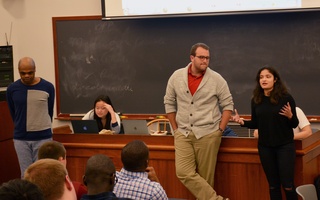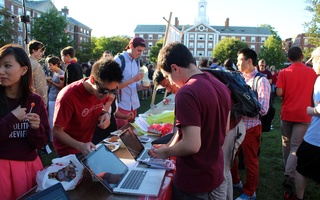{shortcode-a1368e7eeef034b865e3bdb19c5e568bd49dc273} The Undergraduate Council's Rules Committee will only recommend new student groups for approval if they are not too similar to existing ones as part of a College-wide charge to limit redundancies in student organizations.
The Office of Student life assigned the UC Rules Committee with creating new criteria to judge whether or not to recognize new student groups—a procedure previously conducted by the Office of Student Life. Citing a proliferation of student groups at the College, the OSL said it would not recognize any new clubs this semester.
A new plan for club recognition—set to begin in fall 2017—requires the Rules Committee to provide the full UC with a recommendation on whether or not to approve a new club before the OSL will “rubber-stamp” that decision. After a year of provisional status, the UC will have final approval by majority vote, according to the Committee's chair, Evan M. Bonsall ’19.
Among the Rules Committee’s criteria for evaluating prospective clubs is a stipulation that student groups “are not duplicative” and “avoid clear similarities with other student organizations,” Bonsall said.
The Rules Committee’s plan also requires prospective student groups to have at least ten members at the time of their application. Bonsall said that although the ten member requirement existed under the old system, it will be “strictly enforced” by the UC.
Administrators have echoed a concern to limit overlap in student groups. Harvard College is currently home to 442 recognized student organizations.
“The reason that we’re doing this is because again there have been proliferation of student groups which are often quite small in terms of their regular membership. Maybe they only have a few truly committed members, whose mission, whose purpose, whose activities...overlaps to a very, very great degree with multiple other organizations on campus,” Bonsall said.
Bonsall added that the committee had passed its plan onto Assistant Dean of Student Life Alexander R. Miller for official approval, and that he does not expect any “major substantive changes” from the OSL.
He added that he worries that groups with only a few members will misuse privileges that come with College recognition, like the ability to receive funding from Harvard.
“There’s a proliferation of clubs on campus that are very small, they might have two or three or four members, and often times these very small groups are not particularly active, but they can still apply and potentially receive thousands of dollars,” Bonsall said. “We just want to make sure that we’re being fiscally responsible.”
The Council will vote on whether or not to approve the proposed guidelines at their next general meeting on Sunday.
—Staff writer Andrew J. Zucker can be reached at andrew.zucker@thecrimson.com. Follow him on Twitter @andrewjzucker.
Read more in College News
‘Inter-House Dining Societies’ May Face Spatial, Financial Constraints

















